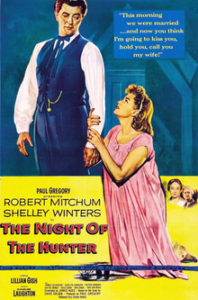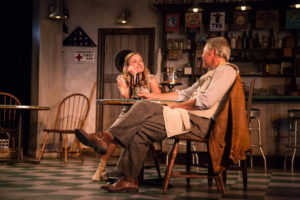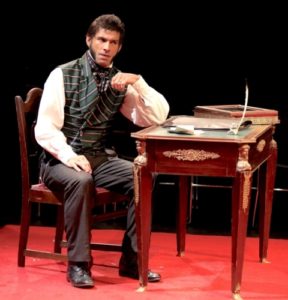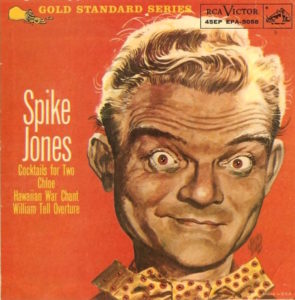 Titus Techera, who hosts a podcast for the American Cinema Foundation on which he and his guests discuss important films of the past and present, invited me back to talk about Charles Laughton’s The Night of the Hunter on his latest episode. (I appeared last month to discuss Laura.) Our hour-long chat is now available on line.
Titus Techera, who hosts a podcast for the American Cinema Foundation on which he and his guests discuss important films of the past and present, invited me back to talk about Charles Laughton’s The Night of the Hunter on his latest episode. (I appeared last month to discuss Laura.) Our hour-long chat is now available on line.
Titus and I spoke in detail about the film, the only one that Laughton directed, which starred Robert Mitchum and Shelley Winters and whose screenplay was adapted by James Agee from Davis Grubb’s best-selling 1953 novel. The screen version flopped at the box office on its original release in 1955 but is now universally regarded as one of the supreme masterpieces of English-language cinema.
Here’s part of Titus’ summary of our conversation:
Titus and Terry Teachout discuss…a remarkable movie about false prophets—the possibility that the devil would come among us in the clothes of a preacher. We talk at length about the various aspects of the making of the movie—actors, script, production, score, and even some editing and cinematography—and we also talk about the moral seriousness served by all these crafts and Laughton’s unity of conception.
To listen to or download this episode, go here.
* * *
The original theatrical trailer for The Night of the Hunter:
A scene from the film:



 Now, very much to my surprise, the Berkshire Theatre Festival has exhumed “The Petrified Forest,” the 1935 stage thriller that made Humphrey Bogart a bad-guy star. What’s more, it’s presenting the play on its main stage in an expensive-looking production directed by David Auburn, the author of “Proof.” All this bespeaks considerable faith in the abilities of a forgotten playwright—and “The Petrified Forest” justifies that faith. It’s not merely stageworthy but excitingly immediate, and Mr. Auburn’s uncommonly well-cast staging enhances the pleasures of a play that is far more than a dusty period piece.
Now, very much to my surprise, the Berkshire Theatre Festival has exhumed “The Petrified Forest,” the 1935 stage thriller that made Humphrey Bogart a bad-guy star. What’s more, it’s presenting the play on its main stage in an expensive-looking production directed by David Auburn, the author of “Proof.” All this bespeaks considerable faith in the abilities of a forgotten playwright—and “The Petrified Forest” justifies that faith. It’s not merely stageworthy but excitingly immediate, and Mr. Auburn’s uncommonly well-cast staging enhances the pleasures of a play that is far more than a dusty period piece. Sherwood was, of course, the staunchest of New Deal liberals, and “The Petrified Forest” is not merely a thriller but a symbolic portrayal of the shaky state of Depression-era American morale, with Squier playing the part of the high-minded but ineffectual liberal intellectual who is galvanized by crisis into decisive action. The good news is that Sherwood never lets his politics overwhelm the plot….
Sherwood was, of course, the staunchest of New Deal liberals, and “The Petrified Forest” is not merely a thriller but a symbolic portrayal of the shaky state of Depression-era American morale, with Squier playing the part of the high-minded but ineffectual liberal intellectual who is galvanized by crisis into decisive action. The good news is that Sherwood never lets his politics overwhelm the plot…. That’s where Jonathan Leaf comes in. Mr. Leaf is the author of, among other things, “The Germans in Paris,” a smart, elegantly wrought 2007 comedy of manners about an imagined but plausible encounter between Heinrich Heine, Karl Marx and Richard Wagner. While he has a Stoppard-like knack for spinning thought-provoking drama out of such speculative scenarios, “Pushkin: A Life Played Out,” a history play in verse about the circumstances leading up to Pushkin’s murder, is not a witty game of what-if. It is, rather, a romantic tragedy, the true story of an idealist who refuses to compromise with the lethal realities of power and so finds himself staring down the wrong end of a gun barrel. Tautly told and staged with hurtling momentum by Christopher McElroen, “Pushkin” is one of the best new plays to open in New York in recent memory, and this fabulously well-acted production, performed in an 80-seat black-box theater, puts you a heartbeat away from the action….
That’s where Jonathan Leaf comes in. Mr. Leaf is the author of, among other things, “The Germans in Paris,” a smart, elegantly wrought 2007 comedy of manners about an imagined but plausible encounter between Heinrich Heine, Karl Marx and Richard Wagner. While he has a Stoppard-like knack for spinning thought-provoking drama out of such speculative scenarios, “Pushkin: A Life Played Out,” a history play in verse about the circumstances leading up to Pushkin’s murder, is not a witty game of what-if. It is, rather, a romantic tragedy, the true story of an idealist who refuses to compromise with the lethal realities of power and so finds himself staring down the wrong end of a gun barrel. Tautly told and staged with hurtling momentum by Christopher McElroen, “Pushkin” is one of the best new plays to open in New York in recent memory, and this fabulously well-acted production, performed in an 80-seat black-box theater, puts you a heartbeat away from the action…. The staying power of Mr. Yankovic’s formula has long since proved itself. But there are other, more specifically musical ways to make funny music. Haydn, the most sophisticated of all musical comedians, did it by spicing up the time-honored formulas of classical music with startling musical jokes, the most celebrated of which is the explosive fortissimo chord that he detonates without warning a half-minute or so into the slow movement of his “Surprise” Symphony. And a century and a half later, Spike Jones and His City Slickers, American pop music’s first great comedy band, dusted off Haydn’s bottomless bag of tricks, using them to cut dozens of records that remain wildly funny to this day….
The staying power of Mr. Yankovic’s formula has long since proved itself. But there are other, more specifically musical ways to make funny music. Haydn, the most sophisticated of all musical comedians, did it by spicing up the time-honored formulas of classical music with startling musical jokes, the most celebrated of which is the explosive fortissimo chord that he detonates without warning a half-minute or so into the slow movement of his “Surprise” Symphony. And a century and a half later, Spike Jones and His City Slickers, American pop music’s first great comedy band, dusted off Haydn’s bottomless bag of tricks, using them to cut dozens of records that remain wildly funny to this day….